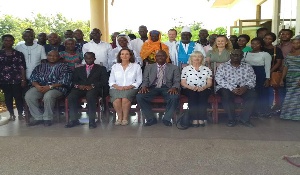Residents of extremely hot areas have been advised to paint their roofs white, which is poor at absorbing heat, to help reduce heat in their rooms, which has consequences on the livelihoods of poor urban dwellers.
They have also been advised to elevate roofs of newly constructed buildings, insulate ceilings, construct houses in a manner that ensures improved airflow through their homes and avoid building materials that generate heat to reduce indoor heat.
Professor Katherine Gough, Professor of Human Geography at Loughborough University, United Kingdom, gave the advice at a dissemination workshop on the Vulnerability to Extreme Weather Events in Cities (VEWEC) project held in Tamale.
The VEWEC project, which was implemented from October, 2017 to November, this year, brought together an expert and an interdisciplinary team to investigate the impacts of flooding and extreme heat on urban infrastructure, and the resultant consequences for the livelihoods of poor urban residents in Tamale and Accra.
The team was constituted by experts from the University for Development Studies (UDS), University of Ghana, and Loughborough University in the United Kingdom, whiles the project was funded by the British Academy.
Findings of the investigation were presented during the dissemination workshop, which showed rising levels of temperature in Tamale with consequences for livelihoods, health care delivery, water and electricity supply.
Within the period of the investigation, temperatures for rooms with metal roofs rose to 45.7 degrees Celsius, temperatures for rooms with thatch roofs hovered around 39 degrees Celsius, those for houses surrounded by trees were lower and those at workshops rose to 61 degrees Celsius.
These extreme temperatures lead to low productivity as people get tired quickly, intermittent electricity and water supply as demand for such utilities rises, challenges for health care delivery as heat makes conditions hard for patients and hospital staff, people resort to poor quality sources of water amongst others, which affects the lives of poor urban residents.
Professor Gough, who suggested ways to adapt to the extreme heat, also asked residents to plant trees for shade, as well as construct canopy extensions to workshops to reduce the heat.
Professor Seidu Al-hassan, Pro Vice-Chancellor of UDS, spoke against haphazard development of structures in cities especially Tamale, saying it contributed to floods and other hazards, calling on all to respect building regulations to help minimize the situation.
Professor Caroline Knowles, who represented British Academy, said the support for the project showed British Academy’s commitment to the country to help improve lives.

General News of Wednesday, 14 November 2018
Source: GNA

















